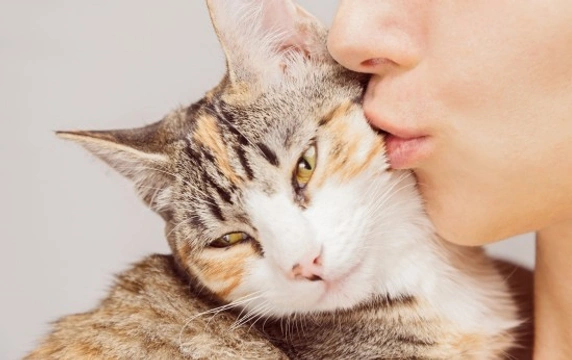Pets
Pets for studWanted petsBreedersAccessories & services
Knowledge hub
Support
Support & safety portal
What do Cats Really Think About People?
Cats have found a place in people's lives and homes for centuries and over time they have become valued members of a household. Today, there are literally millions of domestic cats and it's estimated that for every dog, there are three little felines happily sharing their existence with people all over the planet.
However, unlike dogs our feline friends boast an independent streak which often leaves their owners wondering just what these little furry characters actually think about them. Are people just a food source that provide a safe and warm place where cats can tuck themselves away for all those sleepy hours?
New Study into Cat Behaviour
There have been many studies into cat behaviour and lots of books published on the subject. One recent study that was carried out by an expert in cat behaviour has come up with some quite surprising conclusions as to what cats actually think about people and more importantly about their owners. One of which is the fact that cats don't perceive or understand people in the same way that dogs do.
Much of the research carried out involved observing cats to see how they interacted with each other and how they formed their social structure. This meant watching cats that lived in colonies, cats living in rescue centres and other environments where several cats lived alongside each other.
Another aspect of the research involved watching how cats played with toys during certain times of the day. Owners were observed playing with their feline companions to see how their pets interacted with them. Owners were then given questionnaires to fill out to explain what they thought of their cats.
Cats & Dogs Interact Differently With People
Surprising conclusions included the fact that cats don't actually change their behaviour when they interact with humans, they act much in the same way as they would when socialising with other cats. Dogs on the other hand, are seen to have quite a dramatic change in behaviour when they are around people.
Cats obviously understand they are smaller than people, but this has no apparent bearing on how they behave around them because they do exactly what they would do around another cat. This includes holding their tails high when greet a person much as they would when they encounter another cat they are familiar with, rubbing up against a person's leg much as they would do to a cat and grooming their owner exactly the same way they would groom a house-mate.
Another conclusion that was drawn from the research was that cats think of humans as their bigger counterparts only a lot clumsier because people trip over cats, but a cat would never trip over a person!
The more surprising conclusions that came out of the studies was that many cat owners don't realise how stressed or anxious their pets tend to be about things and situations and how this can have quite a dramatic effect on a cat's state of mind and general well being.
One of the sorest points being that many people don't realise just how stressful it can be for one cat to live with another cat they don't get along with. A situation that may well end up with a cat fight where one or both cats have to be taken to the vet to be treated for their injuries.
The research also came up with the fact that more of our feline friends are suffering from cystitis and dermatitis than ever before. Both are conditions that are frequently triggered by stress. In short, if the conditions are being caused by a cat living with another cat they don't like, the only solution would be to attempt to keep them as far apart as possible which is not always an option.
Why Cats Act Differently Towards Certain People
Cats tend to interact in different ways with people in a household and the study suggested this was because our feline friends are a lot smarter than we may think. A cat learns what ticks the right boxes with different people so if one person is more likely to give them a treat when they get home in the evening, the family cat is going to be waiting in anticipation for them and will follow them around and interact with them because they know they will get their treat.
Are Cats Trainable?
The research also proved that cats can be trained and therefore they can be taught not to do things you don't want them to do, namely jump up on kitchen work surfaces. Cats don't like "loud" noises so if they hear a bang when they do something you don't want them to do, they are quick and smart enough to make the connection and stop doing it.
However, you have to get it right because if you don't, cats are not quick to forget or forgive which means you could end up alienating your feline friend which is something to be avoided at all costs.
Conclusion
The conclusion of these studies showed that cats see people as bigger cats and as such they will not alter their behaviour when they are around humans. Cats are sociable creatures, but only up to a certain point unlike their canine counterparts and although many owners might think having two cats in the home would mean they have constant companionship, a cat might not quite see it that way. The only way of successfully having two or more cats sharing your home is to take them on when they are very young kittens so they grow up together from day one!



